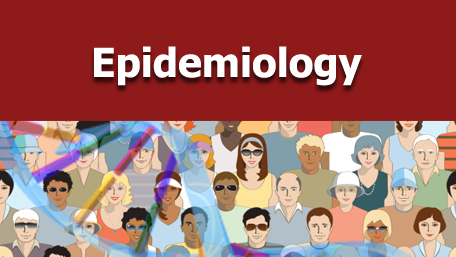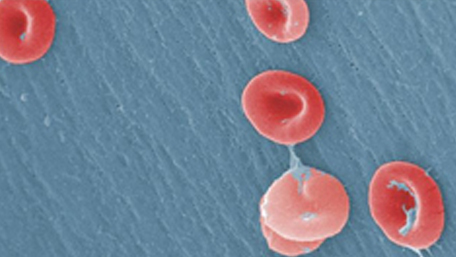Improving the Lives of People with Sickle Cell Disease | Public Health Grand Rounds | CDC
Improving the Lives of People with Sickle Cell Disease
Tuesday, November 15, 2016, at 1 pm EST
Sickle cell disease (SCD) describes a group of inherited disorders that can cause red blood cells to develop in an abnormal rigid sickle or crescent shape. These inflexible sickle-shaped cells can stick to the walls of blood vessels and block the flow of blood completely, leading to a lack of oxygen in surrounding tissues. In addition to sudden, excruciating pain events known as pain crises, SCD can lead to strokes, organ damage, joint and bone problems, and other severe health consequences. The effects of SCD begin around 5 or 6 months of age and continue over a person's lifetime. There is no national registry for SCD, but experts estimate that this disease affects approximately 100,000 people in the United States alone.
Over the past 30 years, treatments for SCD and its complications have improved average life expectancy, but these treatments can be costly and invasive. Additionally, healthcare needs and access to care may change over the course of a patient's life. Through continued collaboration with clinicians, researchers and the SCD community, we can identify critical gaps and better understand how these treatments can improve the lives of people with SCD.
This session of Public Health Grand Rounds discusses SCD, what we know, and how far we have come in just a few decades.
Presented By:
Mary Hulihan, DrPHHealth Scientist, Epidemiology and Surveillance Branch
Division of Blood Disorders
National Center on Birth Defects and Developmental Disabilities, CDC
"Using Data to Understand Gaps in Care and Outcomes"
Division of Blood Disorders
National Center on Birth Defects and Developmental Disabilities, CDC
"Using Data to Understand Gaps in Care and Outcomes"
Kim Smith-Whitley, MD
Medical Director, Sickle Cell Clinical Program
Children's Hospital of Philadelphia
Chief Medical Officer (Immediate Past)
Sickle Cell Association of America
"The Sickle Cell Community and Pediatric Care"
Medical Director, Sickle Cell Clinical Program
Children's Hospital of Philadelphia
Chief Medical Officer (Immediate Past)
Sickle Cell Association of America
"The Sickle Cell Community and Pediatric Care"
Kathryn Hassell, MDProfessor of Medicine, Division of Hematology
University of Colorado Denver
"Improving Outcomes for Adults with Sickle Cell Disease"
University of Colorado Denver
"Improving Outcomes for Adults with Sickle Cell Disease"
Jean Raphael, MD, MPHAssociate Professor, Pediatrics
Baylor College of Medicine
Director, Center for Child Health Policy and Advocacy
Texas Children's Hospital
"A Health Policy Approach to Sickle Cell Disease"
Baylor College of Medicine
Director, Center for Child Health Policy and Advocacy
Texas Children's Hospital
"A Health Policy Approach to Sickle Cell Disease"
Facilitated By:
John Iskander, MD, MPH, Scientific Director, Public Health Grand Rounds
Phoebe Thorpe, MD, MPH, Deputy Scientific Director, Public Health Grand Rounds
Susan Laird, MSN, RN, Communications Director, Public Health Grand Rounds


Last Posted: Nov-10-2016 11AM

Last Updated: Nov 08, 2016
- Improving the Lives of People with Sickle Cell Disease
CDC Public Health Grand Rounds, November 15, 1-2 pm - Birth Weights in Sickle Cell Disease Pregnancies: A Cohort Study.
Meeks Daveena, et al. PloS one 2016 0 (10) e0165238 - Genetics of Sickle Cell-Associated Cardiovascular Disease: An Expert Review with Lessons Learned in Africa.
Geard Amy et al. Omics : a journal of integrative biology 2016 Oct (10) 581-592 - Managing sickle cell carrier results generated through newborn screening in Ontario: a precedent-setting policy story
RZ Hayeems et al, Genetics in Medicine, October 20, 2016 - Pediatric Sickle Cell Disease - Past Successes and Future Challenges.
Meier Emily Riehm et al. Pediatric research 2016 Oct - Associations of Prolonged QTc in Sickle Cell Disease.
Indik Julia H, et al. PloS one 2016 0 (10) e0164526 - 3 Gene Editing Approaches for Sickle Cell Disease
R Lewis, PLOS Blogs, October 13, 2016 - CRISPR deployed to combat sickle-cell anaemia
H Ledford, Nature News, October 12, 2016 - Phenotyping and genotyping of CYP2C19 using comparative metabolism of proguanil in sickle-cell disease patients and healthy controls in Nigeria.
Adejumo Olufunmilayo E, et al. Pharmacology research & perspectives 2016 10 (5) e00252 - Interventions for patients and caregivers to improve knowledge of sickle cell disease and recognition of its related complications.
Asnani Monika R et al. The Cochrane database of systematic reviews 2016 Oct 10CD011175 - With CRISPR, scientists correct genetic mutation that causes sickle cell disease
LA Times, October 12, 2016 - Association between a combination of single nucleotide polymorphisms and large vessel cerebral vasculopathy in African children with sickle cell disease.
Martella Maddalena, et al. Blood cells, molecules & diseases 2016 10 1-3 - Genome-Wide Analysis Identifies IL-18 and FUCA2 as Novel Genes Associated with Diastolic Function in African Americans with Sickle Cell Disease.
Duarte Julio D, et al. PloS one 2016 0 (9) e0163013 - An Expert Review of Pharmacogenomics of Sickle Cell Disease Therapeutics: Not Yet Ready for Global Precision Medicine.
Mnika Khuthala et al. Omics : a journal of integrative biology 2016 Sep - Gene therapy for sickle cell disease passes key preclinical test
Harvard Gazettte, September 2016



- Human (274)
- Pathogen (0)

- Human (59)
- Pathogen (0)

- Guidelines (2)
- Tier Table (0)
- Synthesis (6)

- Huamn (8)
- Pathogen (0)
 Sickle Cell Disease
Sickle Cell Disease





















.jpg)












No hay comentarios:
Publicar un comentario